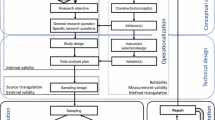Abstract
The German National Educational Panel Study has been set up to collect longitudinal data for educational research. About 60,000 target persons will be questioned and tested within six starting cohorts. This will generate a very large amount of data. Accordingly, one of the most important challenges is to provide comfortable and user-friendly data access that simultaneously allows a high level of data protection. A better infrastructure for research data has been under construction in Germany since the 1990s. Research Data Centers offer a broad range of ways to access data. The National Educational Panel Study is not only matching these common access ways but also developing a remote access solution, called RemoteNEPS. This Secure Data Access will enable users to work with the data from their own computer via a terminal server solution. The data itself will not leave the National Educational Panel Study secure environment. This setting gives the opportunity to provide detailed data to researchers while guaranteeing a high level of data security. As well as providing data security, the concept of RemoteNEPS can be expanded to higher levels of data utility. A community for educational research can be set up to support good scientific practice. Additionally, RemoteNEPS has the capability to handle the structure of the National Educational Panel Study data even after multiple waves or when matching new data from different sources.
Zusammenfassung
Das Nationale Bildungspanel wurde ins Leben gerufen, um Längsschnittdaten für die Bildungsforschung zu erheben. Insgesamt werden 60.000 Personen innerhalb von sechs Startkohorten befragt und getestet, was zu einer sehr großen Datenmenge führen wird. Eine der größten Herausforderungen ist es daher, einen komfortablen und benutzerfreundlichen Datenzugriff anzubieten, der gleichzeitig hohe Datenschutzstandards erfüllt. Seit den 1990er Jahren wird in Deutschland eine moderne Infrastruktur für Forschungsdaten aufgebaut. Forschungsdatenzentren bieten vielfältige Möglichkeiten des Datenzugriffs. Das Nationale Bildungspanel wird sich einerseits an diesen Standards orientieren, zusätzlich aber die moderne Fernzugriffslösung RemoteNEPS entwickeln. Dieses Angebot erlaubt es dem Nutzer mittels einer Terminalserververbindung vom eigenen Rechner aus mit den Daten zu arbeiten. Die Forschungsdaten bleiben dabei in einer sicheren Umgebung auf den Servern des Nationalen Bildungspanels. Diese Rahmenbedingungen ermöglichen es, hochqualitative Mikrodaten unter Einhaltung eines hohen Sicherheitsstandards zur Verfügung zu stellen. Das Konzept RemoteNEPS gewährleistet jedoch nicht nur die Sicherheit der Daten, sondern es ermöglicht auch eine bessere Datennutzung. Dazu gehören die Förderung guter wissenschaftlicher Praxis und die Unterstützung kollaborativer Projekte in der Bildungsforschung.
Similar content being viewed by others
References
American Sociological Association (ASA) (Ed.). (1999). Code of ethics and policies and procedures of the asa committee on professional ethics. http://www.asanet.org/images/asa/docs/pdf/Ethics%20Code.pdf. Accessed 13 Sep 2010.
Bradburn, N., Horton, R., Lane, J., & Tilkin, M. (2006). Developing a data enclave for sensitive microdata. NSF SBE/CISE workshop, March 15–17, 2005. Airlie House, Virginia.
Brandt, M., & Zwick, M. (2009). infinitE—Eine informationelle Infrastruktur für das E-Science Age. Wirtschaft und Statistik, 9, 670–676.
Deutsche Forschungsgemeinschaft (DFG) (Ed.). (1998). Recommendations of the commission on professional self regulation in science: Proposals for safeguarding good scientific practice. http://www.dfg.de/download/pdf/foerderung/rechtliche_rahmenbedingungen/gute_wissenschaftliche_praxis/self_regulation_98.pdf. Accessed 14 Sep 2010.
Deutsche Gesellschaft für Psychologie (DGPs) (Ed.). (2004). Ethischen Richtlinien der DGPs und des BDP. http://www.dgps.de/dgps/aufgaben/ethikrl2004.pdf. Accessed 14 Sep 2010.
Deutsche Gesellschaft für Soziologie (DGS) (Ed.). (1992). Ethik-Kodex der Deutschen Gesellschaft für Soziologie (DGS) und des Berufsverbandes Deutscher Soziologen (BDS). http://www.soziologie.de/index.php?id=19. Accessed 13 Sep 2010.
Gregory, A., Heus, P., & Ryssevik, J. (2009). Metadata (Working Papers No. 57). Berlin: German Council of Social and Economic Data.
Grim, R., Heus, P., Mulcahy, T., & Ryssevik, J. (2009). Secure remote access system for an upgraded CESSDA RI. http://www.cessda.org/project/doc/CESSDA_RI_SRA_FINAL.pdf. Accessed 26 Nov 2010.
Hundepool, A., Domingo-Ferrer, J., Franconi, L., Giessing, S., Lenz, R., Nylor, J., Schulte Nordholt, E., Seri, G., & De Wolf, P.-P. (2010). Handbook on statistical disclosure control. http://neon.vb.cbs.nl/casc/.%5CSDC_Handbook.pdf. Accessed 10 Nov 2010.
Lane, J. (2009). Administrative transaction data (Working Papers No. 52). Berlin: German Council of Social and Economic Data.
Lane, J., & Schur, C. (2009). Balancing access to data and privacy: A review of the issues and approaches for the future (Working Papers No. 113). Berlin: German Council of Social and Economic Data.
Lane, J., & Shipp, S. (2007). Using a remote access data enclave for data dissemination. The International Journal of Digital Curation, 1(2), 128–134.
Lane, J., Heus, P., & Mulcahy, T. (2008). Data access in a cyber world: Making use of cyberinfrastrukture. Transactions on Data Privacy, 1(1), 2–16.
Rubin, D. B. (1993). Discussion statistical disclosure limitation. Journal of Official Statistics, 9(2), 461–468.
Schaar, P. (2009). Data protection and statistics—A dynamic and tension-filled relationship (Working Papers No. 82). Berlin: German Council of Social and Economic Data.
Solga, H., & Wagner G. G. (2007). A modern statistical infrastructure for excellent research and policy advice: Report on the German council for social and economic data during its first period in office (2004–2006) (Working Papers No. 2). Berlin: German Council of Social and Economic Data.
Söderberg, L.-J. (2005). MONA—Microdata ON-line Access at Statistics Sweden. Joint UNECE/Eurostat work session on statistical data confidentiality. Geneva, Switzerland.
Wende, T. (2004). Different grades of statistical disclosure control correlated with German statistics law. In J. Domingo-Ferrer & V. Torra (Eds.), Privacy in statistical databases (pp. 336–342). Berlin: Springer.
Author information
Authors and Affiliations
Corresponding author
Rights and permissions
About this article
Cite this article
Barkow, I., Leopold, T., Raab, M. et al. 20 RemoteNEPS: data dissemination in a collaborative workspace. Z Erziehungswiss 14 (Suppl 2), 315–325 (2011). https://doi.org/10.1007/s11618-011-0192-5
Published:
Issue Date:
DOI: https://doi.org/10.1007/s11618-011-0192-5




